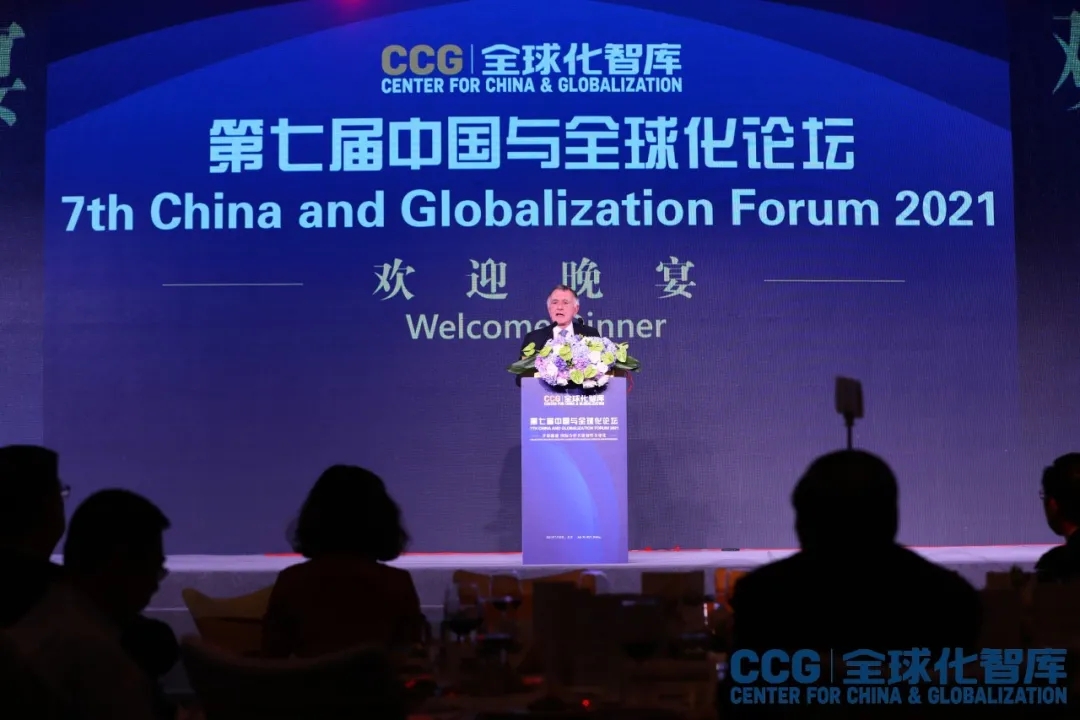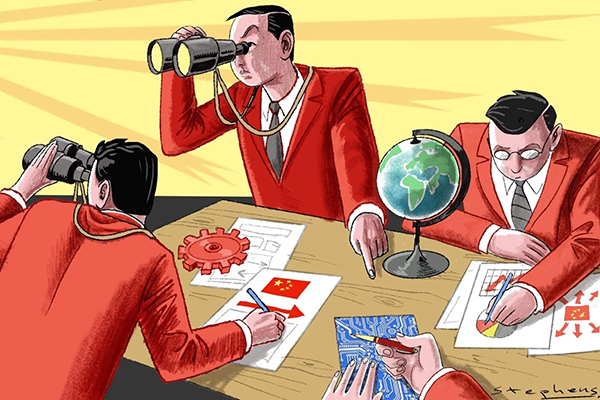EU Ambassador Speaks at CCG Annual Forum
July 30 , 2021

7th Annual China and Globalization Forum
Remarks by Nicolas Chapuis, EU Ambassador to China, at the Welcome Dinner, 29 July 2021
Dear Ambassador Wu, dear Henry, Distinguished guests, Ladies and Gentlemen,It is a privilege being given this opportunity to share with you a few remarks at this welcome dinner of the 7th Annual China and Globalization Forum. I will try to give you a European perspective on the three main questions raised by the organizers:
How will China play a constructive role in driving the global growth while advancing the dual circle strategy and the carbon-neutral goal?
How will the global interplay between geopolitics, trade, and investment shape the future of globalization?
How will Chinese companies and multinationals respond to the tectonic shifts in the global environment?

The magnitude of the economic shock due to the ongoing pandemic has yet to be fully appreciated, but the largest economies – US, China and the EU – are on the rebound and picking up pace. There is no doubt that China has benefited from drastic internal prevention measures allowing an early resumption of production and growth. You may expect the US and the EU economy to recover equally in a strong manner once the ongoing vaccination campaigns eliminate the risk of new outbreaks and lockdowns.
However, neither China nor the rest of the world are out of the woods: inflation concerns, lower level of consumption than expected, and more importantly the fragility of global supply chains, as well as persistent cross-border mobility hurdles, present significant risks that need globally coordinated responses.
Build back better should be one of those responses. These last few weeks, the EU is finalizing the approval of national recovery and resilience plans, while putting on the table concrete first steps for climate neutrality, called “fit for 55”, meant to ensure that the European economy will meet our commitment to reduce net greenhouse gas emissions by at least 55% by 2030, compared to 1990 levels.
We hope that China shows an identical level of resolve in meeting its own commitments of carbon neutrality and of high quality development, as indicated in the 14th 5-year plan. If indeed China weighs about 30% of global growth in the years to come, China’s partners will be seeking solid alignment on global environmental standards, as well as on climate action. The launch earlier this month of China’s Emission Trading Scheme is a positive step in this direction. The upcoming WTO Ministerial Conference is an opportunity for China to take its responsibilities as a global economic power by supporting the reform of the organization.
The pandemic has exacerbated tensions prevailing in the international system. Last Monday’s US-China talks in Tianjin have illustrated their severity: a year ago, the issue was focused on trade and technology; today, it is about the very principle of political coexistence, with dangerous rhetoric about “imaginary enemy” or getting ready for the worst outcomes.
Speaking to Foreign Minister Wang Yi on 8 July, the EU High Representative for Foreign Affairs and Security Policy said that “despite the serious disagreements we have had and still have, working together is not only an option but a necessity”; disagreements have to be tackled squarely and seriously in order to consolidate the basis for cooperation.
We are concerned by the narrative according to which “the East is rising and the West is falling”, and stating that the management of the pandemic has proven the “superiority” of Chinese governance system, and the “failure” of Western liberalism. Such ideas and political point-scoring are not conducive to promote a positive and constructive international agenda, and allow me to say that they are one factor feeding negative perceptions of China in large parts of the world, not only in Europe.
Some would say that ideological differences or geopolitical rivalry are not new and do not prevent trade and investment flows. However, it is only partly true. Globalization means interdependence, and interdependence requires trust, fair competition, level playing field, and, most importantly, common rules of engagement. So we cannot be but concerned by the way China is challenging the rules-based international order, which has instituted global disciplines for more than 70 years. If this means more multipolarity and less multilateralism, more fragmentation and less convergence, more divisions and less consensus, then we, Europeans, whose unity has been forged in order to dispel the spectre of confrontation on our continent, will certainly stand up against such a trend, in accordance with our principles and our values.
3 – The business response
European companies in China have repeatedly voiced their concerns about the continuing deterioration of the business environment. It is not business as usual. Investment decisions tend to be delayed, distortions and overcapacities impede competition, human resources management has become extremely difficult, legal uncertainties increase in view of conflicting regulations and diverging standards between China and the rest of the world. If the largest multinationals have the capacity to wait for better days, this is not the case for smaller companies. And this has consequences: China’s competitors cannot be expected to sit idle. They react.
That is why we have been working so hard until end of last year to conclude the negotiation of a comprehensive agreement on investment, whose main benefit is to bring legal certainty to investors, Europeans and Chinese. It is clearly in China’s interest to secure legal guarantees for its companies who chose, wisely I would say, to invest in Europe.Before the pandemic, Chinese investments in the EU’s internal market have exceeded European investments in China. Until political conditions are met to ratify this agreement, European companies need to be assured that their reasonable expectations for fair competition, level playing field and reciprocity will be met in a constructive way across China. We have reasons to worry this is not always the case.
Business will also have to comply with strengthened rules on due diligence about the integrity of their supply lines. This is good governance, to the benefit of all interested parties. I call on Chinese officials to facilitate such compliance, for none of us wish to be found non- compliant with international norms of corporate responsibility.
In conclusion, we need more than ever a positive agenda between China and the rest of the world. A new push for reform and opening would see China moving beyond the “middle income” level it has now already reached. Differences and disagreements should not be ignored, as there is no future in “besieged fortresses”. As corporate citizens of China, European businesses invest in this country’s growth and sustainability, while providing their expertise and innovation. There is no “East rising and West falling”, we win together or we fail together.
Keyword








